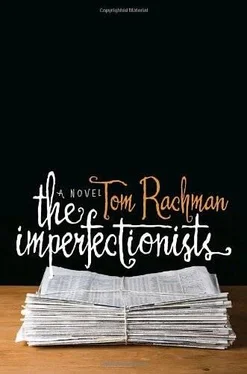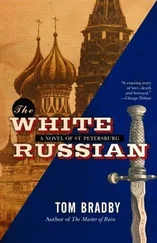Marta, interpreting this as a request to tidy more quickly, responds, "Yes, yes, I do it, I do it."
"Stop-listen a moment. Leave it. Tell me, where did we put today's paper?"
"Which today?"
"This today." Ornella points her finger downward, but that only indicates several thousand todays beneath their feet. She adds, "The today you brought in. The one in the plastic bag."
Marta is hesitant to hand it over, as if this might be a test.
Ornella settles on the living-room sofa, tense with the excitement, pulse elevated. She flaps open today's paper and shifts her backside about on the cushions. She clears her throat, blinks as if to clear her view, and surveys the front page. She turns to Marta who, having been ordered to keep her mistress company, has set up the ironing board in the living room. Ornella asks, "Don't you want to read along with me?"
"No, no."
"There's a lot I'm confused about. I'm counting on your help. Like, who is this Britney Spears, and why has she shaved off all her hair?"
"I don't know," Marta responds, her answer punctuated by a hiss of steam from the iron.
"Here's one: the silly pope made nasty comments about Muslims and now they're threatening to blow up churches." Ornella looks up. "It's not dangerous for you to go to your church, is it? Marta?"
"No, no."
Ornella turns the page. "Seems like everyone is blowing themselves up. And all these computers-do you understand this computer business?"
"What business?"
But Ornella knows too little even to frame a question. "Just in general."
"Not so much."
With a rush of affection, Ornella pats the sofa cushion beside her. "Why don't you stop for a minute and join me! Let me make you some coffee! We can discuss the news. Don't you think that'd be nice for a change?"
Marta, her face strained, looks around at the apartment, at all the floors that need sweeping, all the surfaces that require wiping down. And the dust under the beds?
When Marta's work is done, Ornella walks her to the door. "See you tomorrow?"
"Yes, okay," Marta replies, looking down. "Tomorrow."
1994. CORSO VITTORIO, ROME
By the early 1990s, the success of the paper under Milton Berber was beginning to abate, reflecting declining readership across the industry. Television had been eating away at papers for years, and the rise of twenty-four-hour news channels had dealt another blow. Morning newspapers, written the afternoon before, seemed increasingly out of date. Circulation dipped back under twenty-five thousand.
Of greater concern was Milton himself. Though he remained intellectually robust, his body failed: diabetes, hypertension, weakened vision, hearing loss. In 1994, he gathered the staff.
"Why does the paper exist?" he began.
A few reporters smiled nervously. Someone whispered a wisecrack.
"Seriously," Milton went on, "I've wondered a few times. Why did Cyrus Ott come all the way out here to found this place? Why would such a rich and powerful guy bother? The story is that Ott had a righteous passion for news, and he believed that the world needed a solid publication. I don't buy that. I'm a journalist-temperamentally opposed to noble motives. The truth is, the guy came out here for the pizza."
Everyone laughed.
"As for me," Milton continued, "I can't pretend to any higher motives myself. I just love putting out a newspaper: headlines and deadlines. Nothing noble. But, folks," he concluded, "this is the end of the line for me. It's time to step down."
A few editors gasped.
Milton grinned. "Oh come on-don't act surprised. In a rumor mill like this newsroom, don't pretend you clowns didn't know."
Milton lost his voice then. The room stayed silent, awaiting his next word. He grabbed a copy of that morning's edition, raised it hurriedly, and made for his corner office. It was his final day at the paper. Three months later in Washington, he died of a stroke.
Replacing Milton was not easy. Boyd slotted in a series of middling managers, each of whom lasted a couple of years before retiring on a cushion of Ott stocks. But this did nothing to halt the slide in circulation. The staff was trimmed by attrition; the style pages closed altogether; the culture and sports sections in particular became wastelands.
The paper still filled twelve pages a day, but the proportion of original stories plummeted and wire-service copy proliferated. While other newspapers had been battling the incursions of TV news by adopting color and splashy graphics, the paper remained stolidly black-and-white.
The next challenge was to prove even more formidable: the Internet.
At first, many publications set up websites, charging for access. But readers simply shifted to free content. So media companies slapped more and more online for nothing, expecting that Internet ads would eventually catch up with hemorrhaging print losses.
The paper, however, had an idiosyncratic response: it did nothing. The corrections editor, Herman Cohen, nixed all talk of a website. "The Internet is to news," he said, "what car horns are to music."
"MARKETS CRASH OVER FEARS OF CHINA SLOWDOWN"
CHIEF FINANCIAL OFFICER-ABBEY PINNOLA
ONCE AT THE BOARDING GATE, ABBEY FALLS INTO HER CUSTOMARY travel coma, a torpor that infuses her brain like pickling fluid during long trips. In this state, she nibbles any snack in reach, grows mesmerized by strangers' footwear, turns philosophical, ends up weepy. She gazes at the banks of seats around the departure lounge: young couples nestling, old husbands reading books about old wars, lovers sharing headphones, whispered words about duty-free and delays.
She boards the plane, praying it won't be full. The flight from Rome to Atlanta is eleven hours, and she intends to stretch out-she'll work and sleep, in that order. From the corner of her eye, she spots a man pausing at her row, consulting his ticket. She glares out the window, imploring him away. (Once, she allowed a fellow passenger to engage her in conversation and it became the longest flight of her life. He made her play Scrabble and insisted that "ug" was a word. Since then, her rule has been to never talk on planes.)
The man says, "Well, what d'ya know," and sits beside her. The plane has not even taxied and already he's attempting conversation. She twitches in his direction and offers a faint "Hmm," but does not turn from her window.
He falls silent.
The force and tilt of takeoff awaken her. She was dreaming. About what? Can't remember. She needs her files from the overhead bin, but the Fasten Seat Belts sign is still lit. She drifts back into her travel coma, staring vacantly out the window as the clouds below sink into an infinite mattress.
She studies her fingernails, worrying about Henry, who doesn't want to visit his father in London over the school holidays and is about the age where she can't force him. Is he snubbing his dad out of loyalty to her? She hopes so, and she hopes not. She'll force Henry to go until he reaches a set age. Sixteen, say?
For God's sake! Enough! She has been trying to ignore it, but if this idiot beside her doesn't cede a corner of the armrest, she'll suffocate him with the vomit bag. She makes her elbow as pointy as possible and, very gradually, digs it into his forearm. How long before he gives in?
But he doesn't seem to notice and she is disgusted to touch him, so she gives up. He is picking the skin around his thumb, working free a strand of cuticle. Repugnant. She wants to see what this guy looks like, to attach a face to her loathing, but she can't turn to him without attracting notice. So she imagines him: American, fiftysomething, a loser. Cellulite, dandruff, thyroid on the blink. Works at Office Depot selling industrial ladders. Or does tech support and plays video games after work. Fanny pack, sweat socks, high-tops. What was he doing in Rome, anyway? He'd heard it was full of culture? Had himself photographed at the Colosseum, arm around a rent-a-gladiator?
Читать дальше












